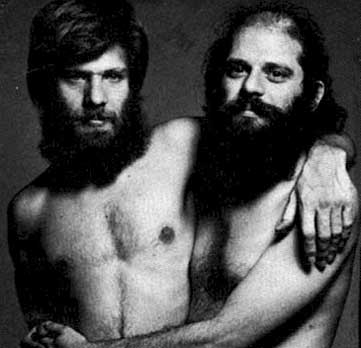 After a while, Allen Ginsberg enjoyed doing just about everything else but cigarette smoking. And he had the politics to support this one eventual self-prohibition, best expressed in his song called "Don't Smoke (Put Down Your Cigarette Rag)." Here is a RealAudio version of the recording. It's a 9 billion dollar capitalist joke.
After a while, Allen Ginsberg enjoyed doing just about everything else but cigarette smoking. And he had the politics to support this one eventual self-prohibition, best expressed in his song called "Don't Smoke (Put Down Your Cigarette Rag)." Here is a RealAudio version of the recording. It's a 9 billion dollar capitalist joke."Doctor," Ginsberg said to his very first psychiatrist in San Francisco, "I don't think you're going to find this very healthy and clear, but I really would like to stop working forever--never work again, never do anything like the kind of work I'm doing now--and do nothing but write poetry and have leisure to spend the day outdoors and go to museums and see friends. And I'd like to keep living with someone -- maybe even a man -- and explore relationships that way. And cultivate my perceptions, cultivate the visionary thing in me. Just a literary and quiet city-hermit existence."
For me the most enjoyable aspect of understanding Ginsberg's writing is to deal straight on, feeling no need to reconcile them, with the two tendencies: stern (however hilarious otherwise) warnings against unethical or politically unconscious acts and ecstatic exploration of life-living resisting custom and normative behavior. In a sense this is the one biggest issue for experimental poetry from the dawn of modernism in the first 20th-century decade--the everyday politics of avant-gardism, how we can be liberated from ugly unbeautiful constraint while living with a new whole notion of communal and even personal rightness.






 "I teach horizontally, meaning that while I might begin with a fixed idea of what I'm going to teach that day, I let it drift rhizomatically way off topic, often pulling it back when it gets too far. I rely on non-fixed materials to teach this way; the whole world is at my fingertips. Should I go off on a tangent about John and Rauschenberg and their love relationship as expressed in Rauschenberg's bed, an image of that bed is always a click away. From there, we can head anywhere into the non-fixed universe, be it film, text or sound. And of course, that always takes us elsewhere. As Cage says, 'We are getting nowhere fast.'"
"I teach horizontally, meaning that while I might begin with a fixed idea of what I'm going to teach that day, I let it drift rhizomatically way off topic, often pulling it back when it gets too far. I rely on non-fixed materials to teach this way; the whole world is at my fingertips. Should I go off on a tangent about John and Rauschenberg and their love relationship as expressed in Rauschenberg's bed, an image of that bed is always a click away. From there, we can head anywhere into the non-fixed universe, be it film, text or sound. And of course, that always takes us elsewhere. As Cage says, 'We are getting nowhere fast.'" 

 that anyone has yet got the imaginative measure of that terrifying day six years ago. Certainly our Tolstoy has not crawled out of the rubble. The closest we have, Don DeLillo, succeeded as an essayist-journalist ("In the Ruins of the Future: Reflections on Terror and Loss in the Shadow of September,” Harper’s, December 2001) but, to my mind, failed as a novelist ("Falling Man"). One reason, perhaps, is that the remembered emotion was instantly buried under a pile of cultural junk.' - Tod Gitlin in his review of Susan Faludi's The Terror Dream (written for
that anyone has yet got the imaginative measure of that terrifying day six years ago. Certainly our Tolstoy has not crawled out of the rubble. The closest we have, Don DeLillo, succeeded as an essayist-journalist ("In the Ruins of the Future: Reflections on Terror and Loss in the Shadow of September,” Harper’s, December 2001) but, to my mind, failed as a novelist ("Falling Man"). One reason, perhaps, is that the remembered emotion was instantly buried under a pile of cultural junk.' - Tod Gitlin in his review of Susan Faludi's The Terror Dream (written for 






























